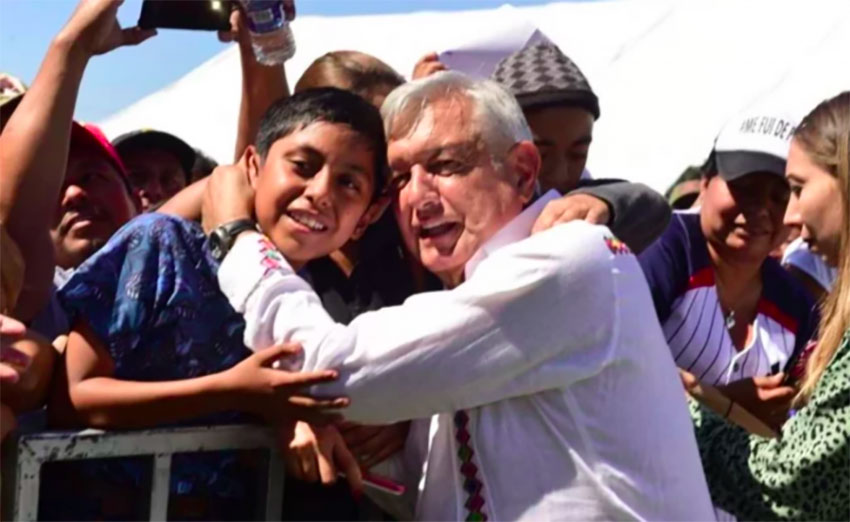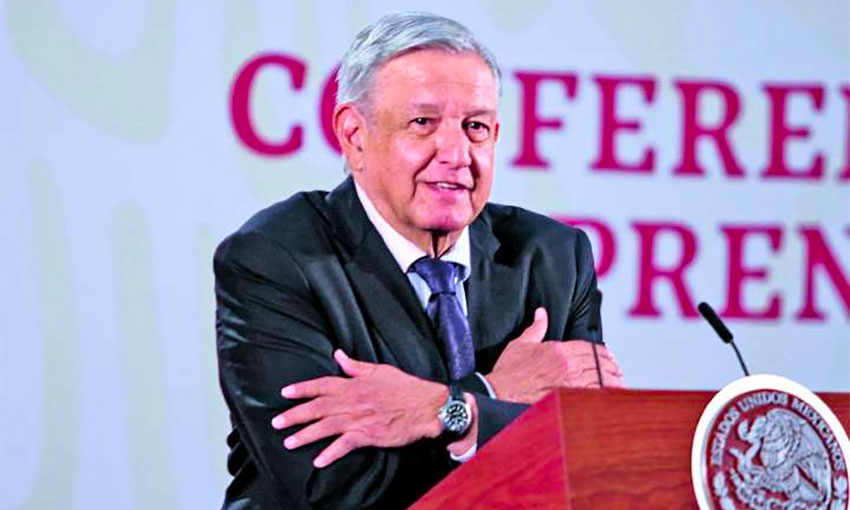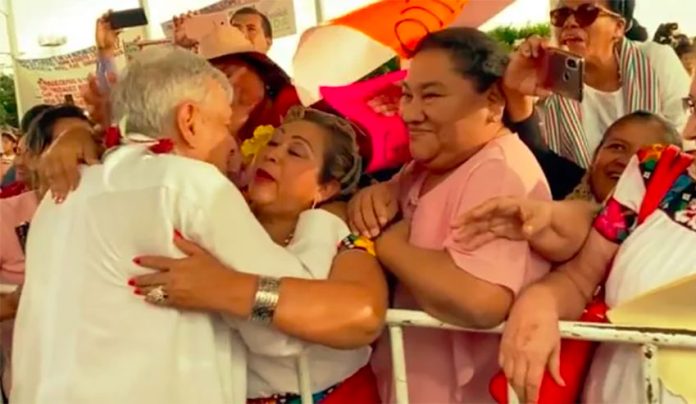Like many other populist leaders around the world, including United States President Donald Trump, Jair Bolsanaro in Brazil, and Imran Khan in Pakistan, Mexican President Andrés Manuel López Obrador (commonly known as AMLO) has mostly taken a dangerously dismissive and outright irresponsible attitude toward the coronavirus.
Late into March, he failed to adopt any necessary preparation for the Covid-19 pandemic. Instead of encouraging social distancing, he encouraged Mexicans to go to fiestas, eat in restaurants, and go out shopping. He has continued to attend rallies, kissing people.
Like “Dr. Beetroot,” a former South African minister of health who spewed criminally-negligent falsehoods that garlic, lemon, and olive oil could cure AIDS, AMLO exhibited pictures of saints as protection against Covid-19.
Some necessary response measures are finally under way in Mexico, but mostly not thanks to AMLO. Like in Brazil where some city and state-level officials — including those who used to be Bolsanaro’s closest allies — have begun breaking away from that president’s blatantly wrong response to Covid-19, some mayors and governors in Mexico are beginning to act on their own, including counter to AMLO.
On March 22, the mayor of Mexico City, Claudia Sheinbaum, cancelled large gatherings and shut down schools and businesses.

Only more recently, when Covid-19 reached the community-based spread phase in the country, did AMLO start sounding a little more cautious. On March 24 and 25, the Ministry of Health finally banned large events and the AMLO government suspended all non-essential activities, though with few details on its implementation and enforcement. The Mexican government also created a cartoon superhero heroine, Susana Distancia, to motivate Mexicans to stay six feet apart.
Even though he campaigned as the end-to-impunity, anti-corruption candidate, AMLO himself continues to violate all of the new regulations. Instead of focusing on beefing up his feeble Covid-19 response and following his own restrictions on travel, AMLO spent March 29 traveling to Sinaloa to meet the mother of the notorious drug trafficker Joaquín “El Chapo” Guzmán.
He shook her hands vigorously in front of TV cameras, tightly surrounded by his officials and local representatives as he received pats on the back. Perhaps Susana Distancia should confront AMLO — from six feet away, of course!
AMLO and his administration have already recklessly endangered the lives of many Mexicans. The country’s infection numbers remain relatively low, but are rapidly rising. On March 26, 475 tested positive for coronavirus; on March 30, 993 tested positive and already 20 deaths had been registered. Moreover, these numbers likely vastly underestimate the actual level of infection, since little testing occurs in Mexico and testing kits are critically lacking.
Mexico’s poorest, whom AMLO seeks to empower, are the most vulnerable. By wasting time and sending the wrong messages, AMLO missed an opportunity to contain the spread of the pandemic in Mexico when it was most containable.
His reluctance to acknowledge the seriousness of Covid-19 — while he clung to a false hope that the pandemic would somehow bypass Mexico despite its interconnectedness with the Covid-ravaged United States — resemble the dithering we’ve seen from Trump, Bolsanaro, and Khan: It’s a misguided attempt to save the country’s faltering national economy. Like the other leaders, AMLO has been trading people’s lives for the delusion that Mexico’s economy can be sheltered from the pandemic.
For over a year, Mexico’s economy has hovered just barely above a recession. That’s very bad for any political leader. In AMLO’s case, the poor performance of the economy also eviscerates his capacity to deliver on the immense redistribution promises he had made to voters. And the 2020 outlook for the Mexican economy is bleak. Many economic forecasting and credit agencies just put forward a devastating prognosis: the most optimistic is from Goldman Sachs, which expects a 1.6% contraction; the most pessimistic predict a 5.8% to 8% contraction. None predicts growth.
Meanwhile, the coronavirus pandemic and the needed response measures hit the poor particularly hard. Like others in Mexico’s informal sector (which constitutes some 60% of the work force), they are highly vulnerable to businesses being forced to shut down and to people avoiding the streets to buy their wares. Their capacity to withstand an economic contraction is limited.
Mexico’s medical sector, overall, is gutted after years of spending cuts — including a 44% cut to a public health and welfare agency by AMLO himself. Budget cuts have left hospitals and clinics short of beds, medical equipment, test kits, and personnel. Around 10,000 medical professionals were laid off in 2019, causing the cancellation or delay of many medical procedures, including surgeries for children.
After recent protests by medical personnel, the AMLO government promised to spend US $150 million on hiring 40,000 medical professionals and procuring additional supplies. But filling the vacancies and getting tests and other supplies in will take time. These measures are barely a drop in the bucket as Mexico confronts Covid-19 with one of the slimmest public health budgets in history of $5.4 billion, equivalent to 2.5% of GDP. Even before Covid-19, Mexican medical experts believed that $341 million per month was needed to keep the medical system afloat.
AMLO compounded their vulnerabilities by shutting down Seguro Popular, an insurance arrangement for people in the informal sector, which covered 60 million people. He complained that Seguro Popular was too costly for its beneficiaries, perniciously “neoliberal,” and rife with corruption. That move is part and parcel of his kneejerk liquidation of the policies and institutions built by previous administrations. He sees the programs of his predecessors as complicit in perpetuating a “mafia of power” and a hinderance to the Fourth Transformation he claims to be implementing.
Instead of Seguro Popular, AMLO announced in January 2020 the creation of Insabi, a medical care program that is supposedly cost-free. But, as has been the fate of other programs announced by a leader who is not interested in policy details and who does not heed warnings about downsides, Insabi — a highly centralized version of Seguro Popular — so far exists mostly on paper.

Moreover, despite AMLO’s promises to the contrary, Insabi has made some procedures costlier, while eliminating coverage for some. And the cost of medication went up, once again hitting the poorest the hardest. The poor in Mexico, who constitute close to half of the country’s population, have no safety net. It wasn’t until late March that AMLO’s government at least sped up transferring resources that had been previously allocated to Insabi.
AMLO’s dismissive attitude toward Covid-19 will not insulate him from the effects of the illness. If large segments of Mexico’s population become ill, the country’s economy will remain suppressed for far longer than necessary. If the outbreak drags on, manufacturing centers and other key businesses may lose far more business and lay off many more workers. And tourists won’t want to visit an infected country.
The AMLO administration’s response to Covid-19 starkly contrasts with the response of the Felipe Calderón administration to the H1N1 swine flu in 2009. The Calderón administration responded with swift, resolute, and effective measures, even if economically costly ones. Rapidly, the Calderón administration banned all public gatherings, shut down schools, and in Mexico City, also all non-essential services. It maintained transparency about the spreading epidemic and closely cooperated with the United States and Canada.
Tragically, AMLO failed to learn from Mexico’s globally-recognized leadership in responding to H1N1. The poor will be hurt as much by Covid-19 as by AMLO’s mishandled policy response. Many elderly poor continue to be family breadwinners in the informal sector.
For a poor family to lose grandparents in Mexico entails other socio-economic consequences: with lower-class parents frequently commuting two to three hours each way to work, it is often the grandparents who see children off to school or watch them afterward. Without the grandparents around, gang recruitment of kids left on the streets on their own may rise.
And how will social distancing be maintained when Covid-19 arrives in Mexico City’s vast crowded slums, or the poor rural communities in Guerrero or Chiapas, with very weak policing and healthcare systems? Perhaps some of Mexico’s criminal groups may act as enforcers of social distancing and care providers there, as is already happening in the favelas of Rio de Janeiro. Their power will thus grow.
Mexico must and still can act better. AMLO must wake up from his delusions and begin adopting and enforcing serious measures to stop Covid-19’s spread, leading by example. But if AMLO persists with spending his political capital and time on visiting the mothers of imprisoned narcos and violating the government’s own regulations, Mexico’s governors and mayors must start acting on their own.
They must impose restrictions on gatherings and work with their medical professionals to prepare for isolating those who contract the virus. And they must not ignore the poor, helping with the provision of food and water so that people can minimize leaving their homes while avoiding starvation.
Vanda Felbab-Brown is a senior fellow in the Center for 21st Century Security and Intelligence in the Foreign Policy program at Brookings. This piece was originally published by Brookings.
